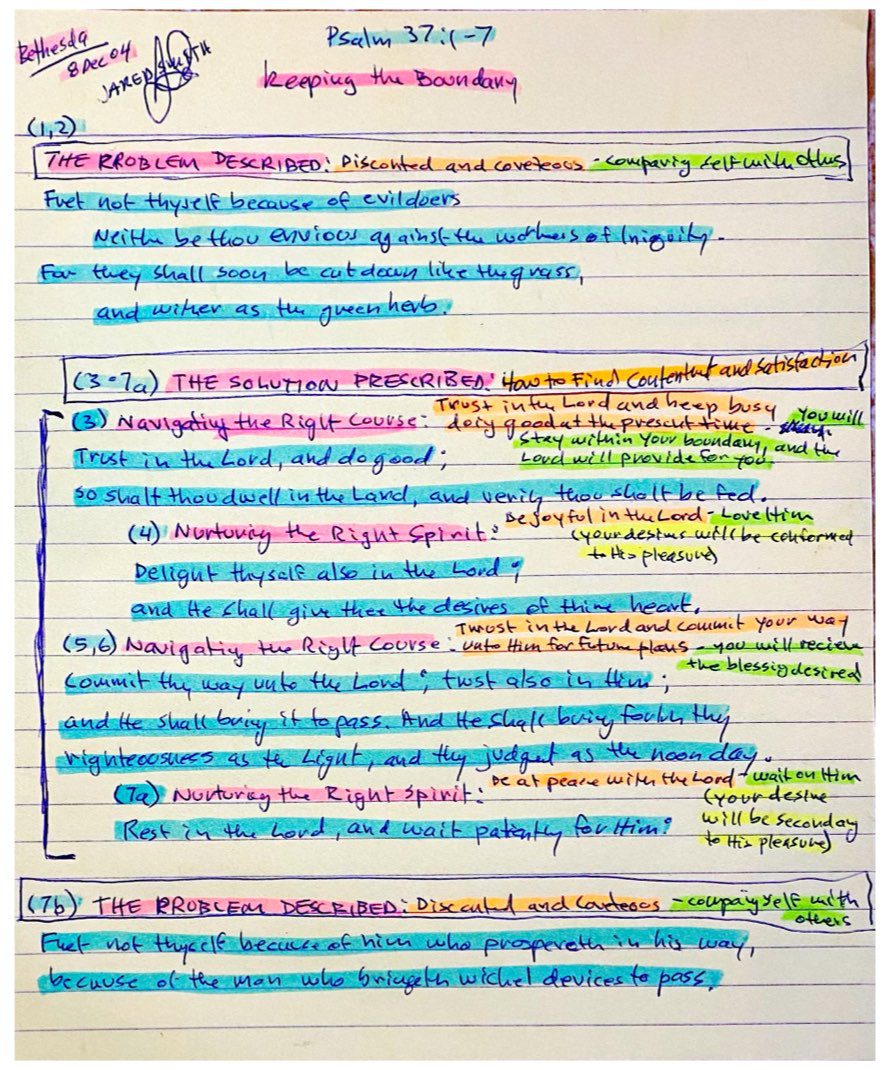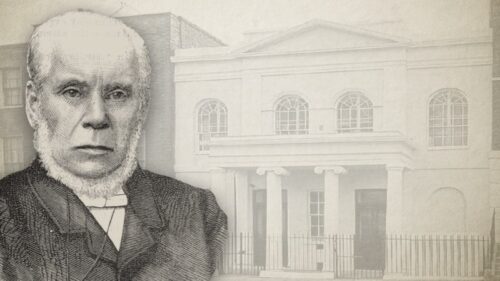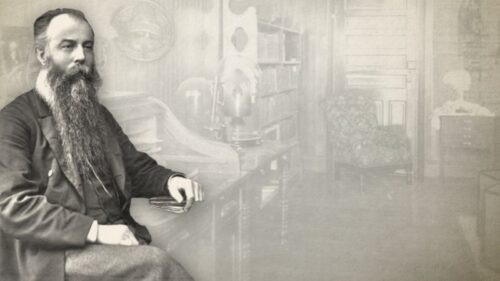
Expository Notes On Psalm 37:1-7: Keeping The Boundary
[The Notes Of A Sermon Preached By Jared Smith To The Church Meeting At Bethesda Chapel, On Sunday 8 December 2024]
The Structure Of The Text—Psalm 37:1-7
(1,2) The Problem Described: Discontented And Covetous—Comparing Self With Others (Their Blessings Will Not Be Forever)
Fret not thyself because of evildoers, neither be thou envious against the workers of iniquity. For they shall soon be cut down like the grass, and wither as the green herb.
(3-7a) The Solution Prescribed: How To Find Contentment And Satisfaction—Learning How To Navigate The Right Course And Nurture The Right Spirit (Blessings Promised: God Will Feed, Satisfy And Lead You)
(3) Navigating The Right Course: Trust In The Lord And Keep Busy Doing Good At The Present Time—You Will Stay Within Your Boundary (Circumstance/Lot In Life) And The Lord Will Provide For You
Trust in the LORD, and do good;
so shalt thou dwell in the land, and verily thou shalt be fed.
(4) Nurturing The Right Spirit: Be Joyful In The Lord And Love Him—Your Desire Will Be Conformed To His Pleasure
Delight thyself also in the LORD;
and he shall give thee the desires of thine heart.
(5,6) Navigating The Right Course: Trust In The Lord And Commit Your Future Plans Unto Him—You Will Receive The Blessing Desired
Commit thy way unto the LORD; trust also in him;
and he shall bring it to pass. And he shall bring forth thy righteousness as the light, and thy judgment as the noonday.
(7a) Nurturing The Right Spirit: Be At Peace With The Lord And Wait On Him—Your Desire Will Be Secondary To His Pleasure (This Is Why There Is No Promise Attached To This Precept—When God Is Your All, He Is Enough)
Rest in the LORD, and wait patiently for him:
(7b) The Problem Described: Discontented And Covetous —Comparing Self With Others (Their Blessings Will Not Be Forever)
fret not thyself because of him who prospereth in his way, because of the man who bringeth wicked devices to pass.
Notes On The Structure
1. It is believed David wrote the Psalm a few years before his death—“I have been young, and now am old; yet have I not seen the righteous forsaken, nor his seed begging bread.” (Ps 37:25) Upon reflection in his old age, he explored the question, Why does God allow the wicked to prosper while leaving His people in difficult circumstances?
2. Within the first seven verses, David gives a twofold description of the problem (1,2 and 7b) with a single statement on a prescribed solution (3-7a).
3. The problem (1,2 and 7b) is not the prosperity of the wicked, but the discontentment and covetousness of the Lord’s people. David points out the obvious—the prosperity of the wicked is short-lived.
4. The solution (3-7a) is arranged under two headings—First, navigating the right course (3 and 5,6); Second, nurturing the right spirit (4 and 7b).
5. Navigating the right course requires the believer to trust in the Lord in the here and now as well as for the future. With regards to the here and now (verse 3), the believer is to keep busy and remain diligent discharging his/her responsibilities (doing good) towards those activities or people of present concern. With regards to the future (verses 5,6), the believer is to commit (resign/cast) his/her way unto the Lord.
6. Nurturing the right spirit requires the believer to delight (verse 4) and rest in the Lord, waiting patiently for Him (verse 7a). To delight in the Lord nurtures one’s love for Him. To rest in the Lord nurtures one’s peace with Him.
7. There are three promises attached to the first three precepts—First, (verse 3) those who trust in the Lord and keep busy doing good at the present time will remain within their boundary (circumstance/lot in life), enjoying the provisions of the Lord no matter how difficult the challenge (Proverbs 27:8—“As a bird that wandereth from her nest, so is a man that wandereth from his place.”); Second, (verse 4) those who delight in the Lord will discover their desires conforming to His pleasure, guaranteeing He will give them the desires of their heart (James 4:3: ”Ye ask, and receive not, because ye ask amiss, that ye may consume it upon your lusts.”); Third, (verses 5,6) those who trust in the Lord and commit their future plans to Him will eventually see those plans brought to pass—their righteous plans (judgments) will be brought to pass as the noonday (Proverbs 3:5,6: ”Trust in the LORD with all thine heart; and lean not unto thine own understanding. In all thy ways acknowledge him, and he shall direct thy paths.”)
8. By design, there is no promise attached to the last precept (verse 7a). The last precept is connected to the second precept (verse 4), directing the believer on how to nurture a right spirit. It begins with delighting one’s self in the Lord, which will conform his/her desires to the pleasure of the Lord. It culminates with resting in the Lord and waiting patiently for Him, which ultimately reduces one’s desire to be of secondary importance. When the believer finds true delight and rest in the Lord, He becomes the believer’s chief desire, and therefore no promise of the Lord’s provision or the believer’s desires is mentioned. The Lord Himself is enough. (Song of Solomon 5:10: ”My beloved is…the chiefest among ten thousand.”) This was the experience of Abraham, who, having become the protector of his nephew Lot and then refusing to keep the spoils of war, the Lord said unto him, “Fear not, Abram: I am thy shield, and thy exceeding great reward.” (See Genesis 14 and 15) Whereas Abraham was Lot’s shield, the Lord was his shield; whereas Abraham refused to take the spoils of war, the Lord was his exceeding great reward. When the Lord is the believer’s all, nothing else is necessary—”Therefore take no thought, saying, What shall we eat? or, What shall we drink? or, Wherewithal shall we be clothed? (For after all these things do the Gentiles seek:) for your heavenly Father knoweth that ye have need of all these things. But seek ye first the kingdom of God, and his righteousness; and all these things shall be added unto you. Take therefore no thought for the morrow: for the morrow shall take thought for the things of itself. Sufficient unto the day is the evil thereof.” (Matthew 6:31-34) In the words of J. A. Jones:
When earthly friends their faces change,
I’m not surpris’d nor think it strange,
Or creatures rashly blame;
‘Twas God ordained it to the end,
I might the more on Him depend
Who always is the same.
Welcome, my friends, for friends you’ll be
So long as He doth wisely see
Your friendship will be best:
When He sees meet to pull me down,
My friends shall change, or on me frown
In this, I’m also blest.
Farewell, my smooth and easy way,
Since God ordains that as my day
My strength shall also be:
Lord, grant me this! let all the rest
Be managed as Thou seest best,
I’m happy still in Thee.
Farewell enjoyment of the mind,
How oft, alas! do Christians find
All discompos’d within;
And yet no changes in my frame
Change my dear Lord, He’s still the same
As He has ever been.
This is the sum of every bliss,
A God in Christ! what joy is this,
It cannot be express’d!
This God, this Christ, I will esteem
My only good; for I, in Him,
Have everlasting rest.

Jared Smith served twenty years as pastor of a Strict and Particular Baptist church in Kensington (London, England). He now serves as an Evangelist in the Philippines, preaching the gospel, organizing churches and training gospel preachers.
Jared Smith's Online Worship Services
Jared Smith's Sermons
Jared Smith on the Gospel Message
Jared Smith on the Biblical Covenants
Jared Smith on the Gospel Law
Jared Smith on Bible Doctrine
Jared Smith on Bible Reading
Jared Smith's Hymn Studies
Jared Smith on Eldership
Jared Smith's Studies In Genesis
Jared Smith's Studies in Romans
Jared Smith on Various Issues
Jared Smith, Covenant Baptist Church, Philippines
Jared Smith's Maternal Ancestry (Complete)





